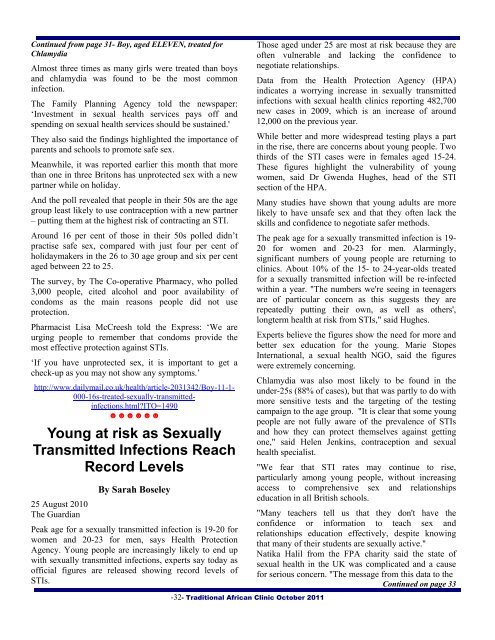African Traditional Herbal Research Clinic STD's ... - Blackherbals.com
African Traditional Herbal Research Clinic STD's ... - Blackherbals.com
African Traditional Herbal Research Clinic STD's ... - Blackherbals.com
Create successful ePaper yourself
Turn your PDF publications into a flip-book with our unique Google optimized e-Paper software.
Continued from page 31- Boy, aged ELEVEN, treated for<br />
Chlamydia<br />
Almost three times as many girls were treated than boys<br />
and chlamydia was found to be the most <strong>com</strong>mon<br />
infection.<br />
The Family Planning Agency told the newspaper:<br />
‘Investment in sexual health services pays off and<br />
spending on sexual health services should be sustained.'<br />
They also said the findings highlighted the importance of<br />
parents and schools to promote safe sex.<br />
Meanwhile, it was reported earlier this month that more<br />
than one in three Britons has unprotected sex with a new<br />
partner while on holiday.<br />
And the poll revealed that people in their 50s are the age<br />
group least likely to use contraception with a new partner<br />
– putting them at the highest risk of contracting an STI.<br />
Around 16 per cent of those in their 50s polled didn’t<br />
practise safe sex, <strong>com</strong>pared with just four per cent of<br />
holidaymakers in the 26 to 30 age group and six per cent<br />
aged between 22 to 25.<br />
The survey, by The Co-operative Pharmacy, who polled<br />
3,000 people, cited alcohol and poor availability of<br />
condoms as the main reasons people did not use<br />
protection.<br />
Pharmacist Lisa McCreesh told the Express: ‘We are<br />
urging people to remember that condoms provide the<br />
most effective protection against STIs.<br />
‘If you have unprotected sex, it is important to get a<br />
check-up as you may not show any symptoms.’<br />
http://www.dailymail.co.uk/health/article-2031342/Boy-11-1-<br />
000-16s-treated-sexually-transmittedinfections.htmlITO=1490<br />
☻☻☻☻☻☻<br />
Young at risk as Sexually<br />
Transmitted Infections Reach<br />
Record Levels<br />
By Sarah Boseley<br />
25 August 2010<br />
The Guardian<br />
Peak age for a sexually transmitted infection is 19-20 for<br />
women and 20-23 for men, says Health Protection<br />
Agency. Young people are increasingly likely to end up<br />
with sexually transmitted infections, experts say today as<br />
official figures are released showing record levels of<br />
STIs.<br />
-32- <strong>Traditional</strong> <strong>African</strong> <strong>Clinic</strong> October 2011<br />
Those aged under 25 are most at risk because they are<br />
often vulnerable and lacking the confidence to<br />
negotiate relationships.<br />
Data from the Health Protection Agency (HPA)<br />
indicates a worrying increase in sexually transmitted<br />
infections with sexual health clinics reporting 482,700<br />
new cases in 2009, which is an increase of around<br />
12,000 on the previous year.<br />
While better and more widespread testing plays a part<br />
in the rise, there are concerns about young people. Two<br />
thirds of the STI cases were in females aged 15-24.<br />
These figures highlight the vulnerability of young<br />
women, said Dr Gwenda Hughes, head of the STI<br />
section of the HPA.<br />
Many studies have shown that young adults are more<br />
likely to have unsafe sex and that they often lack the<br />
skills and confidence to negotiate safer methods.<br />
The peak age for a sexually transmitted infection is 19-<br />
20 for women and 20-23 for men. Alarmingly,<br />
significant numbers of young people are returning to<br />
clinics. About 10% of the 15- to 24-year-olds treated<br />
for a sexually transmitted infection will be re-infected<br />
within a year. "The numbers we're seeing in teenagers<br />
are of particular concern as this suggests they are<br />
repeatedly putting their own, as well as others',<br />
longterm health at risk from STIs," said Hughes.<br />
Experts believe the figures show the need for more and<br />
better sex education for the young. Marie Stopes<br />
International, a sexual health NGO, said the figures<br />
were extremely concerning.<br />
Chlamydia was also most likely to be found in the<br />
under-25s (88% of cases), but that was partly to do with<br />
more sensitive tests and the targeting of the testing<br />
campaign to the age group. "It is clear that some young<br />
people are not fully aware of the prevalence of STIs<br />
and how they can protect themselves against getting<br />
one," said Helen Jenkins, contraception and sexual<br />
health specialist.<br />
"We fear that STI rates may continue to rise,<br />
particularly among young people, without increasing<br />
access to <strong>com</strong>prehensive sex and relationships<br />
education in all British schools.<br />
"Many teachers tell us that they don't have the<br />
confidence or information to teach sex and<br />
relationships education effectively, despite knowing<br />
that many of their students are sexually active."<br />
Natika Halil from the FPA charity said the state of<br />
sexual health in the UK was <strong>com</strong>plicated and a cause<br />
for serious concern. "The message from this data to the<br />
Continued on page 33
















